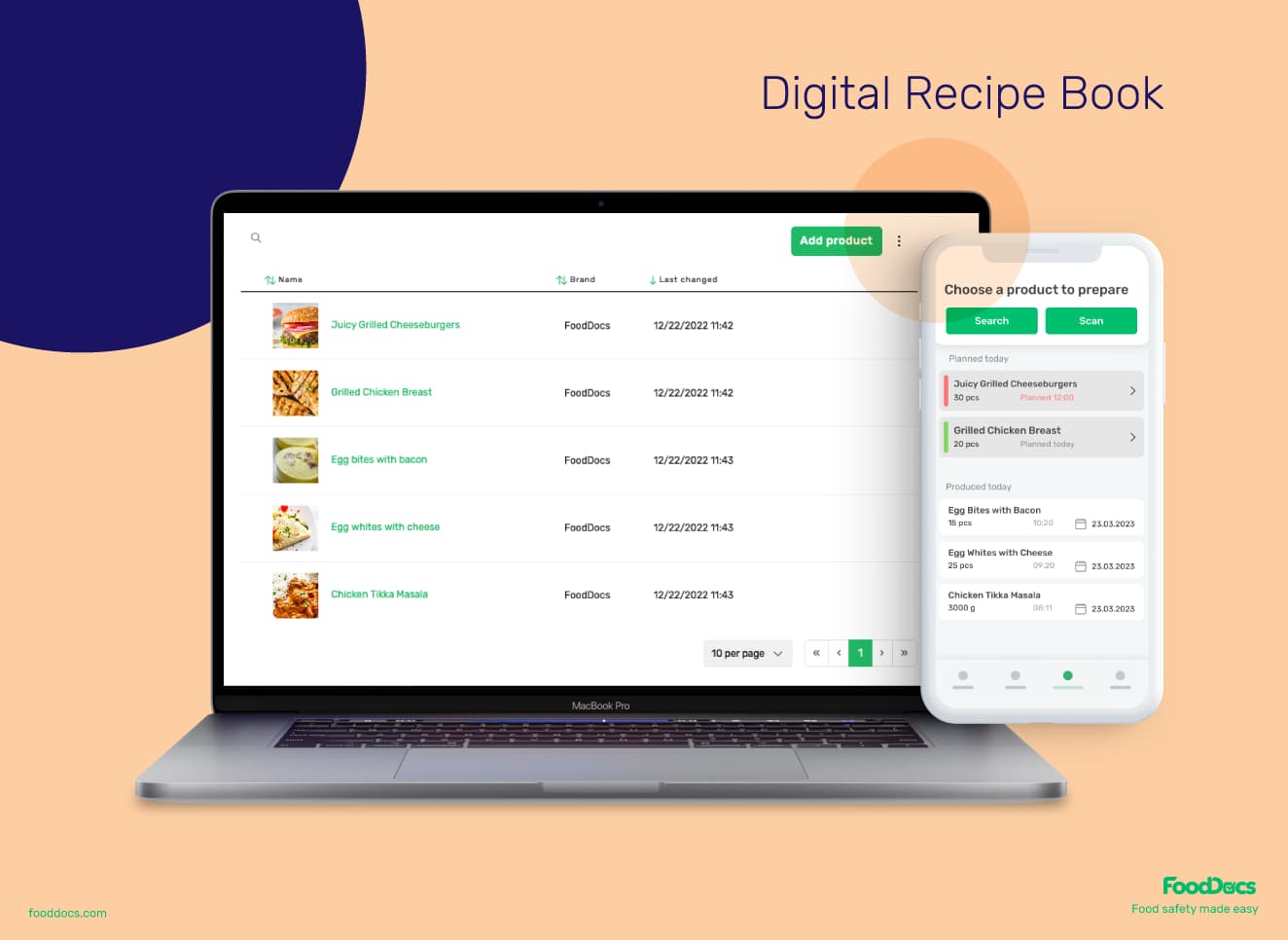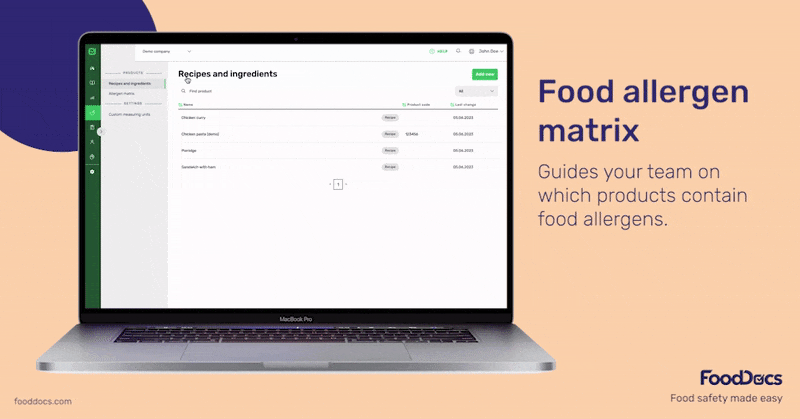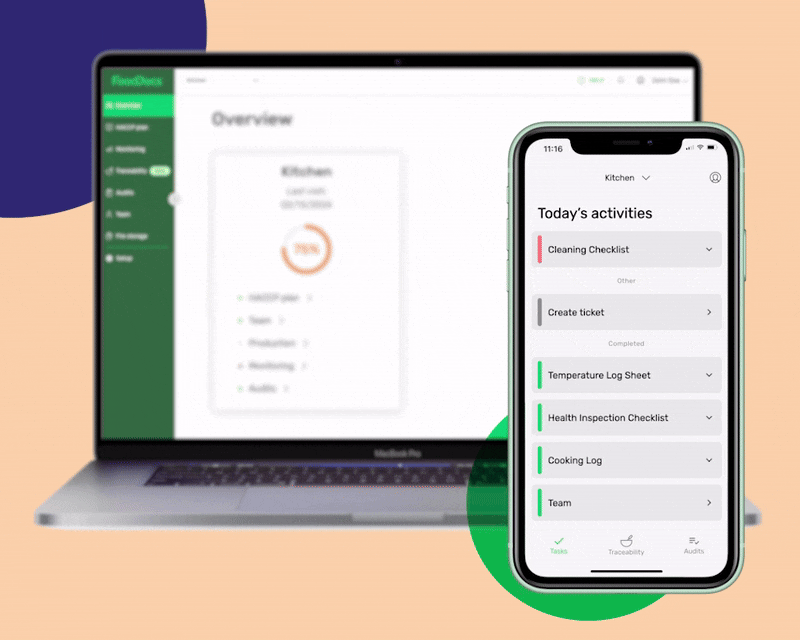
[ad_1]
Uncover the most recent in CMS dietary laws for nursing houses and the way sensible meals security administration techniques can improve nursing house residents’ lives.
All of us benefit from the company to eat – for essentially the most half – what we would like, after we need, and the way we would like. Whether or not it’s good-for-you meals or bad-for-you meals.
However many seniors might really feel like they lose that luxurious the second they transfer into nursing houses. Even when a resident is obtainable a wide range of meals or is on a “common” eating regimen versus a stricter one, the CMS dietary laws for nursing houses typically hamstring providing sure meals.
Layer on prime of that, consuming a number of meals you’re not an enormous fan of and you’ll sympathize with simply how robust that is perhaps for a nursing house resident. For context, in line with the Nationwide Middle for Well being Statistics, the typical size of keep amongst all nursing house residents is 485 days.
At three meals per day, that’s 1,455 meals over the course of 1’s keep. After all, that is assuming {that a} nursing house resident doesn’t like several of the meals (which gained’t essentially be the case). Nevertheless, it paints a useful image of the challenges nursing house employees face surrounding eating regimen and diet, inside and outdoors the kitchen.
Key factors coated:
- Certified dietitians should maintain a U.S. bachelor’s diploma (or larger) and at the least 900 accomplished hours of supervised dietetics observe
- Regulatory compliance ensures high quality care and maintains residents’ well being.
- CMS dietary laws instantly contribute to resident satisfaction.
- Dietary laws affect the general high quality of life in nursing houses.
- The sum of fines for some states vary from 4 to eight figures on account of nursing house deficiencies.
- Attending doctor should be the one who prescribes a therapeutic eating regimen, however she or he can delegate the therapeutic eating regimen prescription to a professional dietitian.
- Not more than 14 hours ought to move between night meals and the following day’s breakfast.
- FoodDocs will help dietitians and nursing house employees keep compliant with digital audits, add educative directions to monitoring duties to coach your staff, in addition to manage recipes, calculate substances, and handle allergens with a Sensible Recipe Ebook.
The knowledge you’ll achieve on this article will make you and your dietician(s) extra assured in nursing house dietary laws. Let’s dive in.
The Significance of Adhering to CMS Dietary Rules
We can not understate the influence that CMS tips have on the care planning course of and dietary administration in nursing houses. They form the format and frequency of meal plans, pushing dietitians to craft appropriate regimens that consider all points of the resident’s life – from their well being to cultural preferences – to make sure every particular person receives optimum nourishment.
When dietitians correctly adhere to CMS dietary tips, they assist stop malnutrition, persistent illnesses, and different well being issues related to poor eating regimen, enhancing the standard of life for nursing house residents. Whereas not excellent, this can be a testomony to how legislative measures will help nurture a more healthy and happier getting older inhabitants.
Key CMS Pointers for Dietitians
The Facilities for Medicare and Medicaid Companies (CMS) dietary laws for nursing houses are exhaustive, with a number of tips tailor-made particularly for dietitians. These legislative efforts intention to make sure constant, high-quality diet look after residents.
One of many notable CMS tips mandates the presence of certified dietitians and dietary employees in nursing houses.
Within the following sections, you may discover crucial points of the CMS State Operations Handbook that that relate to dietary laws for nursing houses. Our objective is to current you with a simplified but detailed approach to achieve details about CMS dietary laws that can assist you grow to be a greater nursing house dietitian.
What defines a professional dietitian?
In part 483.60, the CMS’s State Operations Handbook defines a “certified dietitian” as somebody with the tutorial necessities who:
- Holds a bachelor’s diploma (or larger) from a United States accredited faculty or college (or an equal non-U.S. diploma) together with a accomplished diet or dietetics program from a related nationally accredited group.
- Has at the least 900 accomplished hours of supervised dietetics observe, supervised by a registered dietitian or diet skilled.
- Has a State-approved license or certification to carry out dietary or dietary providers. (In case your State doesn’t present a license or certification, certified dietitians might want to meet necessities 1 and a pair of above, or achieve recognition from the Fee on Dietetic Registration or its successor group.)
- Meets these necessities no later than 5 years after November 28, 2016 or as required by state legislation, for dietitians employed or contracted with previous to November 28, 2016.
Ideally, these amenities ought to make use of a full-time certified dietitian or diet skilled. However within the case that this isn’t potential, the nursing house must designate somebody as a director of meals and diet providers.
In case you’d like extra details about what {qualifications} administrators of meals want, we cowl all of it in our information to nursing house kitchen laws.

The Position of Dietitians in Nursing Properties: A Nearer Look
They do not merely plan common meals in nursing houses. Dietitians type a necessary a part of the healthcare staff, making certain the residents’ dietary wants are nicely catered for, even when well being situations and drugs use might pose challenges.
They undertake a serious activity by making certain compliance with CMS laws, that are designed to ensure the most effective dietary look after residents.
To look at the position of a dietary supervisor inside a nursing house, let’s have a look at the important thing obligations or requirements that they’ll be held accountable for, as outlined within the steering for part 483.60(a)(1)-(2):
- Assessing residents’ dietary wants
- Overseeing the price range and purchases of meals and provides
- Supervising meals preparation, meals service, and meals storage
- Collaborating in food- and nutrition-related high quality assurance and efficiency enhancements (QAPI)
- Creating and implementing curricula for all nursing house employees (e.g., instructional applications about meals and diet providers)
- Evaluating and growing each common and therapeutic diets, which incorporates assembly residents’ specialised wants (e.g., texture of meals and liquids)
Dietitians additionally implement plans and monitor their effectiveness, making crucial adjustments to accommodate budding well being considerations or to enhance dietary uptake. These and extra are carried out whereas strictly staying throughout the confines of CMS laws.
Nursing house amenities generally determine people who will help assess residents’ dietary standing, together with physicians, pharmacists and, who we’re speaking about right this moment, dietitians.
Certified dietitians, for instance, will assist look at a resident’s dietary threat elements primarily based on their targets, preferences, wants, age, eating regimen historical past and, if current, medical situation. From there, they’ll counsel any related interventions to assist enhance his or her diet and general well being.
A professional dietitian may even create (or at the least inform) nursing house residents’ dietary plans, once more, paying explicit consideration to their medical situations, meals allergic reactions, and private preferences.
This underscores simply how important dietitians are within the nursing house ecosystem.
Sustaining (and Bettering) Resident Satisfaction
On the coronary heart of it, dietitians in nursing house settings care deeply in regards to the residents they assist. Whereas CMS dietary laws could be burdensome, they play an influential position in resident satisfaction. There’s loads of analysis exhibiting simply how positively impactful meals could be. In actual fact:
When nursing houses adhere to CMS dietary laws, they assure different, well-balanced meals that cater to residents’ dietary wants and private preferences. This, in flip, can considerably improve the residents’ satisfaction with their dwelling situations, instilling a way of consolation and belonging.

Handle your nursing house recipes together with an routinely generated and repeatedly up to date allergen matrix utilizing FoodDocs Digital Recipe Ebook.
How Dietitians Guarantee Compliance with CMS Rules
Dietary professionals embrace a multi-layered method to perform compliance. They begin with cautious documentation of every resident’s dietary wants and associated data.
This documentation, when correctly maintained, helps in retaining monitor of adjustments within the sufferers’ well being profiles and making certain their dietary routine will get adjusted accordingly.
Now let’s break this down in additional element…
Menus and dietary adequacy
If a nursing house has adequate employees, dietitians and their groups ought to be capable of confidently present up-to-standard menus and dietary adequacy.
Nursing house menus should:
- Be adopted
- Be repeatedly up to date
- Be ready upfront
- Meet the dietary wants of residents primarily based on nationwide tips
- Not take any of beforehand listed factors to restrict a resident’s proper to make private dietary selections
- Be reviewed by the power’s dietitian or different clinically certified diet skilled for dietary adequacy
- Replicate the ethnic, cultural, and spiritual wants of the nursing house’s resident inhabitants, primarily based on a facility’s affordable efforts and enter gathered from residents (and resident teams)
A few of these laws appear so apparent. We agree; why wouldn’t you put together a nursing house menu upfront? Or not meet the dietary wants of residents?
However these guardrails assist to carry dietitians and different nursing house employees accountable, and supply a basis on which to construct nice experiences for residents – whether or not it’s a brief keep or an extended one.
Historical past additionally factors to why nursing house laws as an entire are crucial, regardless of how apparent they might be.
Nursing house inspection information from ProPublica present a state-by-state breakdown of nursing house deficiencies and complete prices of penalties the state could also be dealing with. The sum of fines for some states vary from 4 to eight figures! ( you, Illinois…)
Wording reminiscent of “affordable effort” sounds subjective. However because the CMS defines it, “affordable effort” signifies that dietitians or diet professionals have:
- Assessed particular person resident’s wants and preferences
- Actively tried to satisfy these wants and preferences by inquiring about sure meals and whether or not they are often bought or served, in addition to adjusting meals preparation strategies
Whereas it’s difficult to evaluate a person resident’s wants at scale, it is this affordable effort that permits nursing house dietitians to study their wants and kitchen employees to correctly put together nutritious, pleasurable meals that gained’t go to waste.
That mentioned, nursing houses have residents recognized with dementia, for instance. In these particular instances the place residents may not be capable of successfully or clearly talk their dietary needs or wants, dietitians ought to doc the steps they’ve taken to attempt to perceive what these are.
As we talked about earlier, assessing people’ wants at scale poses many challenges: not sufficient varieties of meals, understaffed kitchens, the checklist goes on.
There’s a cause why eating places have set menus. In any other case it will be chaos!
Fortunately, the Facilities for Medicare and Medicaid Companies perceive this actuality. That’s why it’s not essentially required that nursing houses present each resident with a customized menu.
Nevertheless, if there’s a selected meal or main menu {that a} resident doesn’t like, nursing houses ought to – as a lot as potential – search to offer another that aligns with their wants.
Foods and drinks
One of many dietitian’s main targets of high-quality food and drinks is that the meals nursing house kitchens serve incorporates the very best potential dietary worth.
Because of this meals just isn’t uncovered to extended:
- Holding on steam tables
- Cooking in massive volumes of water
- Meals storage, mild, or air publicity
If you break it down, chunk of the day is spent consuming meals. Relating to consuming and ingesting, every resident receives and the power gives:
- Meals that’s been ready utilizing strategies that keep look, taste and, most significantly, its dietary worth
- Palatable, enticing meals which are served at secure and appetizing temperatures to forestall scalds or burns
- Main menu objects that kitchen employees put together in a manner that meets particular person residents’ wants (this contains interesting options which have comparable dietary worth for individuals who request one thing completely different)
- Various meals that accommodate resident preferences, however particularly allergic reactions and intolerances
- Drinks adequate to take care of resident hydration (e.g., water and different drinks or meals objects that may grow to be liquid at room temperature)
 Use the FoodDocs allergen matrix to information groups on which merchandise include meals allergens.
Use the FoodDocs allergen matrix to information groups on which merchandise include meals allergens.
When nursing house residents obtain scrumptious and visually-appealing meals that’s able to eat, it should doubtless encourage them to devour a wholesome quantity.
As soon as they willingly eat and drink adequate quantities, they enhance nutrient and hydration ranges which can’t solely assist keep good well being, however assist in a resident’s therapeutic course of.
Therapeutic diets
In keeping with the CMS, a “therapeutic eating regimen” has many functions. It may be used to assist a nursing house resident who, for instance, has a illness or wants to scale back/enhance, must altogether take away explicit vitamins from their eating regimen, or requires a mechanically altered eating regimen (e.g., modifying sure meals’s texture).
With that in thoughts, the attending doctor:
- Should be the one who prescribes a therapeutic eating regimen
- Could delegate the therapeutic eating regimen prescription to a professional dietitian
Sure, there are even occasions the place an attending doctor will activity a nursing house facility’s dietitian (or certified diet skilled) with writing a resident’s dietary orders who acts throughout the State’s scope of observe and is below that doctor’s supervision.
Some individuals consider {that a} resident’s doctor ought to be the only real particular person making these selections. However constructing flexibility into CMS dietary laws is optimistic for a lot of causes.
It doesn’t simply unencumber physicians’ finite time, particularly in an atmosphere the place many residents demand his or her time. It permits dietitians to extra incessantly assessment nursing house residents’ diet plans and dietary necessities primarily based on their evolving well being wants.

Frequency of meals
For nursing house residents, consistency is essential and the frequency of meals is only one manner that nursing houses can enhance their high quality of life.
Take into account that frequency right here doesn’t imply round the clock mealtimes. Kitchen employees want relaxation, afterall.
Nevertheless it does imply that dietitians and nursing house employees want to make sure that residents obtain each appropriate and nourishing meals and snacks on a schedule that finest meets their wants and requests. This contains residents preferring to eat at non-traditional occasions (e.g., later within the night versus the usual 5:00 PM dinnertime).
As soon as dietitians have recognized these residents and their necessities, the prepare dinner(s) – if it’s outdoors of the kitchen’s hours of operation – must put together meals or snacks forward of time.
Usually, nursing house dietitians want to concentrate on three CMS tips relating to meal frequency:
- Based mostly on care plans, private requests, and particular person wants (or at comparatively regular meal occasions), nursing houses should present every resident three or extra meals every day.
- As long as it aligns with a resident’s complete care plan, nursing house employees should present appropriate and nourishing snack and meal options in the event that they need to eat non-traditional or non-scheduled occasions.
- Not more than 14 hours ought to move between night meals and the following day’s breakfast. The one time a window of as much as 16 hours is allowed is that if nursing house employees serve a resident a night snack at bedtime and this resident agrees to the timespan between meals.
With regard to snacks, some nursing houses are experimenting with the usage of extra frequent snacking as an alternative of the normal three meals per day. Apparently, researchers discovered that snacking can “type a pure bridge between socialization, meals reminiscences, and improved dietary consumption, thereby contributing to food-related high quality of life for residents in care.”
CMS Rules for Meal Instances: What Is the 14-hour Rule?
As talked about within the final level above, the 14-hour rule is a big regulation that helps to manage meal timing and frequency in nursing houses. This rule is in place to assist stop pointless fasting and keep blood sugar ranges for residents.
This rule dictates meal planning and scheduling in nursing houses. Adjusting meal occasions throughout the 14-hour window gives flexibility and aids in sustaining a stability between diet consumption and metabolism. As such, it requires strategized scheduling and impacts your complete circulating system of the nursing house from the kitchen employees to the caregivers.
The CMS 14-hour rule for meal occasions ensures constant and well timed supply of meals, demonstrating a holistic method in the direction of sustaining the residents’ well being. Nursing houses that adhere to this rule yield a more healthy, happier resident neighborhood, fostering a way of consolation and growing resident satisfaction.
Adapting to New Dietary Rules: How
Adjustments Have an effect on Nursing Properties
Rules change. They enhance. They innovate.
And whereas the objective of those updates is to enhance the lives of nursing house residents and the employees who assist them on a regular basis, rolling with the punches of regulatory adjustments is less complicated mentioned than achieved.
As we’ve discovered up to now, it seems that state-mandated dietary laws are putting extra significance on patient-centric meals service. From making certain that dietitians are contemplating all residents’ preferences and selections to offering meals in a dignified and respectful manner, there’s little question that that is optimistic for nursing houses.
However with elevated scrutiny over meals security and high quality management, non-compliance could possibly be problematic. Bear in mind the ProPublica stat we shared earlier? Nursing houses proceed to face penalties and even revocation of certification.
So what can nursing house dietitians and different certified dietary professionals do in mild of regulatory adjustments?
3 Sensible Suggestions for Nursing Dwelling Dietitians
As these laws evolve, it’s incumbent upon nursing houses to adapt. Listed here are a number of tricks to streamline the variation course of:
- Steady Training: Organize common coaching assets and applications to maintain employees apprised about these adjustments. Constant communication helps guarantee everybody is aware of what’s required and might make acceptable adjustments. Notably for these on the chef’s hat, who have to mix diet with resident preferences.
- Assessment your service course of: Assessment and adapt your meals service procedures to respect the dignity and selections of the residents. This would possibly name for adjustments in eating space preparations, timing, and even how meals is served.
- Replace high quality management measures: Guarantee your processes align with the up to date security and high quality management laws. A routine audit will help nip potential compliance points within the bud.
Navigating by the wave of regulatory adjustments is daunting but crucial. Lively adaptation and steady studying aren’t nearly ticking a compliance guidelines however mirror your establishment’s dedication to its residents.
Heading into Compliance: Navigating CMS Dietary Rules for Nursing Properties with FoodDocs
Understanding CMS dietary laws is essential for making certain premium high quality care in nursing houses whereas nonetheless assembly dietary tips. Compliance would not need to be taboo or boring or onerous. You possibly can truly make meals safey straightforward.
That’s the place FoodDocs are available in.
 Simply full meals security monitoring duties with an online and cell app in FoodDocs.
Simply full meals security monitoring duties with an online and cell app in FoodDocs.
No bank card wanted.
Bear in mind, small adjustments can result in vital enhancements. Higher outcomes begin on the plate.
[ad_2]